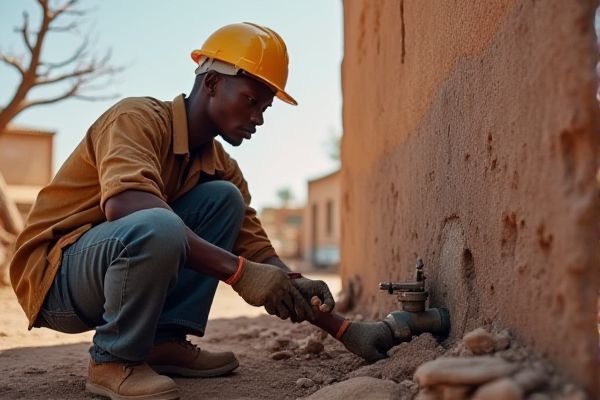
Ethiopia's rapidly developing economy has increased demand for skilled plumbers, presenting numerous job opportunities in both urban and rural settings. Major cities like Addis Ababa and Dire Dawa are witnessing construction booms, creating a need for plumbing professionals in residential, commercial, and industrial projects. Workers with experience in installing, repairing, and maintaining plumbing systems are particularly sought after, and certifications can enhance job prospects. Employment options range from working with construction companies to providing independent services, catering to the ever-growing infrastructure development needs in the country.
Job Description
Plumbing jobs in Ethiopia encompass a range of tasks, including the installation, maintenance, and repair of piping systems for water supply and drainage. Professionals in this field often work on residential, commercial, and industrial projects, ensuring that systems comply with local regulations and standards. Knowledge of local plumbing codes and the ability to troubleshoot various issues are essential skills for success in this role. With Ethiopia's growing infrastructure demands, opportunities in plumbing continue to expand, offering competitive salaries and the chance to contribute to community development.
Requirement
In Ethiopia, plumbing jobs often require a high school diploma or equivalent, along with specialized training in plumbing systems and installations. Familiarity with local building codes, safety regulations, and water conservation practices is essential. Employers typically seek candidates with practical experience, which can be gained through apprenticeships or on-the-job training. Strong troubleshooting skills and the ability to work in various environments, including residential and commercial settings, will enhance your employability in this growing field.
Salary and Perks Expected
In Ethiopia, plumbing jobs typically offer a salary range between 4,000 to 12,000 Ethiopian Birr per month, depending on experience and location. Skilled plumbers with advanced certifications or specialized skills may command higher wages, particularly in urban areas like Addis Ababa. Besides the salary, benefits often include health insurance, vocational training opportunities, and sometimes accommodation allowances. Understanding the local job market can help you negotiate better terms and make informed career decisions.
Similar Job Names
- Plumbing Technician
- Plumbing Apprentice
- Plumbing Inspector
- Pipefitter
- Plumbing Foreman
- Plumbing Designer
- HVAC and Plumbing Engineer
- Plumbing Contractor
- Water Supply Engineer
- Sanitation Engineer
- Maintenance Plumber
- Drainage Specialist
- Plumbing Sales Representative
- Plumbing Estimator
- Plumbing Project Manager
Job Expectation Concept
Plumbing jobs in Ethiopia encompass a variety of tasks, including installation, maintenance, and repair of water supply and drainage systems. The demand for skilled plumbers is increasing as infrastructure projects expand and urbanization accelerates. Understanding local plumbing codes and regulations is essential for success in this field, as compliance ensures safety and efficiency. Your commitment to quality workmanship can significantly enhance job prospects and contribute to the overall development of the country's plumbing industry.
Career Advantage and Weakness
Plumbing jobs in Ethiopia offer significant career advantages, including steady demand for skilled professionals due to ongoing infrastructure development and urbanization. Job stability and competitive pay attract many individuals to this trade, as both residential and commercial sectors require reliable plumbing services. However, there are weaknesses, such as limited access to advanced training and resources, which can hinder skill development and career advancement. Additionally, cultural perceptions of plumbing as a less prestigious profession may affect your opportunities for growth in certain areas of the country.
Important Thing Must Know
Plumbing jobs in Ethiopia offer diverse opportunities due to the growing infrastructure development across urban and rural areas. Skilled plumbers are in high demand, as both residential and commercial sectors require reliable water supply and waste management systems. Understanding local building codes and regulations is essential for compliance and ensuring quality work. Training programs and vocational schools in Ethiopia help aspiring plumbers acquire the necessary skills and certifications. Staying informed about the latest plumbing technologies can enhance job prospects and improve service quality in your community.
Alternative Career Options
A career in plumbing in Ethiopia can lead to various alternative options that leverage your skills and expertise. You might explore roles in construction management, where knowledge of plumbing systems is vital for ensuring compliance and functionality in new builds. Another option is transitioning into plumbing installation and maintenance for large-scale industrial projects, which often demand specialized services. Training in sustainable practices can open doors to eco-friendly plumbing solutions, catering to the growing demand for water conservation in urban and rural areas alike.
Companies List
- Ethiopian Airlines
- African Union
- Dashen Bank
- Hilton Addis Ababa
- Ethiopian Electric Power
- Ethio Telecom
- Addis Ababa University
- Coca-Cola Beverages Africa
- Heineken Brewery
- Ethiopian Roads Authority
List of Ideal City
In Ethiopia, cities like Addis Ababa, Bahir Dar, and Dire Dawa offer promising opportunities for plumbing jobs. Addis Ababa, the capital, has a rapidly expanding infrastructure that requires skilled plumbers to meet the increasing demand. Bahir Dar, known for its tourism and growing residential areas, also presents job openings for plumbing professionals. Dire Dawa, with its strategic location for trade, benefits from various development projects, further enhancing plumbing job prospects for you.
 jobs-ethiopia.com
jobs-ethiopia.com